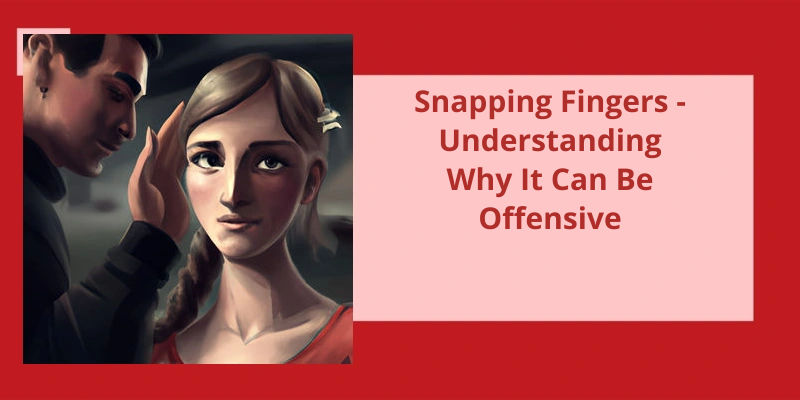In our social interactions and relationships, it’s common to encounter individuals who simply refuse to see their own faults and flaws, and instead place blame on others. These people may harm relationships, bring negativity, and hinder the growth and progress of themselves and those around them. The task of making someone realize that they’re the problem can be a daunting one, requiring tact, empathy, and a deep understanding of human behavior. Whether it's a friend, colleague, or loved one, helping someone understand their own negative impact can be a delicate process that requires patience and the right approach. In this article, we will explore some tips and strategies for how to make someone realize they’re the problem, and how to do so in a way that’s respectful and productive for everyone involved.
How Do You Make Someone Realize That They Are Wrong?
When it comes to making someone realize they’re wrong, it’s important to approach the situation with empathy and understanding. Before confronting them, take time to determine how deeply you feel about the situation. Are your emotions clouding your judgement, or do you’ve a clear and objective perspective? Once you’ve a clear understanding of your own feelings, formulate a plan for how to approach the conversation.
When confronting the person, make sure to remain calm and rational. Avoid getting defensive or attacking them personally. Instead, focus on making them relate to the situation and understand your perspective. Let them see how their actions have hurt you or others, and explain why it’s important to address the situation.
To help them truly understand the gravity of their actions, it can be helpful to let them see you hurt. This doesn’t mean you should fake or exaggerate your emotions, but rather be vulnerable and honest about how their behavior has impacted you.
If the person is still resistant, it may be necessary to get their attention in a major way. This could mean involving a third party or taking more drastic measures to highlight the severity of the situation.
Throughout the conversation, it’s important to treat the person with respect and dignity, even if you strongly disagree with their actions. Avoid using language that’s judgmental or accusatory, and instead focus on logical explanations and clear communication.
By staying calm and rational, communicating effectively, and treating the person with respect, you can help them deeply understand the impact of their actions and work towards a resolution.
It can be frustrating when someone doesn’t realize they’ve made a mistake. It can be difficult to watch them continue in their ways. However, there are ways to help them see their error without causing conflict or making things worse. Here are five tips for making someone realize they’ve made a mistake.
What to Do When Someone Doesn T Realise Their Mistakes?
When someone doesn’t realize their mistakes, it can be extremely frustrating and even hurtful. Whether it’s a friend, family member, or romantic partner, it’s important to know how to handle the situation in a positive and productive way. The first step is to stay away for a bit. This doesn’t mean cutting off all contact, but rather taking a step back and giving them space to reflect on their actions and choices. It may be difficult to resist the urge to confront them right away, but sometimes distance can be the best thing for both parties.
Another key factor in helping someone realize their mistake is to avoid arguing at all costs. Arguments can easily escalate and become counterproductive. It’s better to approach the situation calmly and rationally, even if you feel angry or upset. This will show them that you’re willing to listen and work together towards a solution. Remember, the goal isn’t to prove who’s right or wrong, but to help them understand the impact of their actions.
Bringing up past experiences can also be a slippery slope. It’s important to focus on the present and future instead of dwelling on past mistakes. This doesn’t mean completely ignoring the past, but rather reframing the conversation towards what can be done moving forward. It’s also important not to judge or criticize them for their past actions, as this will only make them defensive and less likely to listen.
One of the most powerful ways to make someone realize their mistake is to focus on yourself. This means taking responsibility for your own reactions and emotions. It’s easy to get caught up in the other persons behavior, but ultimately you’ve control over your own actions. Show them that you’re capable of handling the situation maturely and respectfully. This won’t only help them see the error of their ways, but also earn their respect and trust in the long run.
Finally, be the future you want to see. This means setting a positive example for how you want them to behave. Instead of criticizing or belittling them for their mistakes, show them how to do better. Lead by example and make a conscious effort to model kindness, compassion, and forgiveness. This won’t only help them learn from their mistakes, but also create a healthier and happier relationship overall. Overall, helping someone realize their mistakes takes patience, understanding, and a willingness to work together towards a positive outcome.
Now, let’s shift our focus to the topic of interpersonal communication. In particular, we’ll explore the delicate art of convincing someone that they’re mistaken, without causing offense or resistance. Whether you’re dealing with a stubborn friend, a combative colleague, or a contrarian family member, there are ways to engage in constructive dialogue and ultimately help them see your point of view. However, following these tips from Dr. Kwong, a renowned psychologist, can help you navigate this process effectively. But first, let’s take a look at a pressing issue facing many communities: air quality during wildfire season.
How Do You Make Someone Realize They Are Wrong?
When it comes to making someone realize that they’re wrong, there are a few key strategies that can be effective. First, it’s important to assess whether or not correcting someone is truly necessary. In some cases, it may be better to let things go, especially if the mistake is minor or inconsequential. However, there are certainly situations where it’s important to speak up and correct misinformation, especially if it could cause harm or negative consequences.
This can help to gently guide them towards the correct answer or conclusion, while still allowing them to feel as though they’ve some level of control over their own thought process.
One essential component of correcting someone involves leading with empathy over ego. Rather than approaching the situation with an aggressive, confrontational attitude, it’s important to approach it with genuine care and concern for the other persons well-being. This can help to prevent hurt feelings or defensiveness, and can make the overall interaction more productive and positive.
Finally, it’s worth considering the potential consequences of correcting someone. While it can be tempting to swoop in and correct misinformation right away, it’s important to think about whether doing so will actually create more problems than it solves. In some cases, it may be better to let things go and to work on building more positive relationships with the people around us.
On a different note, as wildfires continue to ravage parts of the world, air quality has become a major concern for many people. One way to stay informed about local air quality is to use a monitoring app designed specifically for that purpose. There are several different options to choose from, each offering slightly different features and metrics to help you get a better sense of the air quality in your area. By using one of these apps, you can stay informed, take appropriate precautions, and protect yourself and your loved ones from the harmful effects of wildfire smoke.
Source: What’s the best way to make someone realise that …
Conclusion
In conclusion, it’s never easy to make someone realize that they’re the problem. However, it’s crucial to address the issue to prevent further damage and negative impact on others. The first step in this process is to approach the situation with empathy and compassion. One should also be clear and specific about the behavior that needs to change and how it’s affecting others. Active listening, open communication, and setting boundaries are crucial elements for success in this type of conversation. It’s important to remember that change takes time, and it isn’t always easy to accept one's faults. But with patience and persistence, individuals can learn to take responsibility for their actions and behavior, leading to greater personal growth and stronger relationships with those around them.






